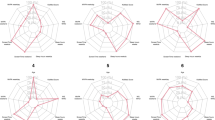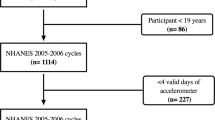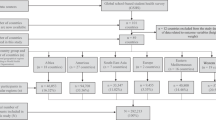Abstract
Background/objectives
To investigate adherence to the Mediterranean diet (MD) and the relationship between MD and lifestyle factors in a representative sample of Greek school children.
Subjects/methods
The data derived from 232,401 (51% boys) children aged 8 to 17 years old who participated in a health survey (2015). Physical fitness (PF) and anthropometric estimations were obtained by trained investigators. Physical activity (PA) status, sedentary activities and sleeping hours were assessed through self-completed questionnaires. Mediterranean diet was evaluated via KIDMED test.
Results
Forty percent of participants presented an optimal adherence to MD (≥8), while one to ten incorporated a low adherence to MD (≤3), in both genders. Participants with optimal adherence to MD presented a more favourable status in anthropometric and lifestyle characteristics. Adjusting for several potential confounders, increased screen time (<2 h/d) augmented odds of low adherence by 135% (95% CI: 2.216–2.491) and 150% (95% CI: 2.346–2.687), in boys and girls, respectively. For each 1-year enlarge in the age of children the odds of low adherence to MD enlarged by almost 11% (95%CI: 1.101–1.138) in both genders, while, boys had almost 6% increased probabilities to the low adherence (95%CI: 1.039, 1.102) than girls. Furthermore, insufficient sleeping hours (>2 h/d) and inadequate PA status were connected to higher odds of low adherence to MD.
Conclusions
Support a modest adherence to the MD and an enhancement considered necessary to adjust dietary intake to current guidelines. However, screen time presented a strong association with low adherence to MD.
This is a preview of subscription content, access via your institution
Access options
Subscribe to this journal
Receive 12 print issues and online access
$259.00 per year
only $21.58 per issue
Buy this article
- Purchase on Springer Link
- Instant access to full article PDF
Prices may be subject to local taxes which are calculated during checkout
Similar content being viewed by others

References
Serra-Majem L, Ribas L, Ngo J, Ortega RM, Garcia A, Perez-Rodrigo C, et al. Food, youth and the Mediterranean diet in Spain. Development of KIDMED, Mediterranean Diet Quality Index in children and adolescents. Public Health Nutr. 2004;7:931–5.
Craigie AM, Lake AA, Kelly SA, Adamson AJ, Mathers JC. Tracking of obesity-related behaviours from childhood to adulthood: A systematic review. Maturitas. 2011;70:266–84.
Martinez-Gonzalez MA, Bes-Rastrollo M. Dietary patterns, Mediterranean diet, and cardiovascular disease. Curr Opin Lipidol. 2014;25:20–6.
Giugliano D, Esposito K. Mediterranean diet and metabolic diseases. Curr Opin Lipidol. 2008;19:63–8.
Psaltopoulou T, Sergentanis TN, Panagiotakos DB, Sergentanis IN, Kosti R, Scarmeas N. Mediterranean diet, stroke, cognitive impairment, and depression: A meta-analysis. Ann Neurol. 2013;74:580–91.
Schroder H. Protective mechanisms of the Mediterranean diet in obesity and type 2 diabetes. J Nutr Biochem. 2007;18:149–60.
Tremblay MS, LeBlanc AG, Kho ME, Saunders TJ, Larouche R, Colley RC, et al. Systematic review of sedentary behaviour and health indicators in school-aged children and youth. Int J Behav Nutr Phys Act. 2011;8:98.
Costarelli V, Koretsi E, Georgitsogianni E. Health-related quality of life of Greek adolescents: the role of the Mediterranean diet. Qual Life Res. 2013;22:951–6.
Farajian P, Risvas G, Karasouli K, Pounis GD, Kastorini CM, Panagiotakos DB, et al. Very high childhood obesity prevalence and low adherence rates to the Mediterranean diet in Greek children: the GRECO study. Atherosclerosis . 2011;217:525–30.
Mazaraki A, Tsioufis C, Dimitriadis K, Tsiachris D, Stefanadi E, Zampelas A, et al. Adherence to the Mediterranean diet and albuminuria levels in Greek adolescents: data from the Leontio Lyceum ALbuminuria (3L study). Eur J Clin Nutr. 2011;65:219–25.
Vassiloudis I, Yiannakouris N, Panagiotakos DB, Apostolopoulos K, Costarelli V. Academic performance in relation to adherence to the Mediterranean diet and energy balance behaviors in Greek primary schoolchildren. J Nutr Educ Behav. 2014;46:164–70.
Lydakis C, Stefanaki E, Stefanaki S, Thalassinos E, Kavousanaki M, Lydaki D. Correlation of blood pressure, obesity, and adherence to the Mediterranean diet with indices of arterial stiffness in children. Eur J Pediatr. 2012;171:1373–82.
Browning LM, Hsieh SD, Ashwell M. A systematic review of waist-to-height ratio as a screening tool for the prediction of cardiovascular disease and diabetes: 0.5 could be a suitable global boundary value. Nutr Res Rev. 2010;23:247–69.
Research CoECoEoS. Eurofit: handbook for the Eurofit tests of Physical fitness 1993. 1-75 p.
Grigorakis DA, Georgoulis M, Psarra G, Tambalis KD, Panagiotakos DB, Sidossis LS. Prevalence and lifestyle determinants of central obesity in children. Eur J Nutr. 2016;55:1923–31.
Colley RC, Wong SL, Garriguet D, Janssen I, Connor Gorber S, Tremblay MS. Physical activity, sedentary behaviour and sleep in Canadian children: parent-report versus direct measures and relative associations with health risk. Health Rep. 2012;23:45–52.
Paruthi S, Brooks LJ, D’Ambrosio C, Hall WA, Kotagal S, Lloyd RM, et al. Consensus Statement of the American Academy of Sleep Medicine on the Recommended Amount of Sleep for Healthy Children: Methodology and Discussion. J Clin Sleep Med. 2016;12:1549–61.
Kontogianni MD, Vidra N, Farmaki AE, Koinaki S, Belogianni K, Sofrona S, et al. Adherence rates to the Mediterranean diet are low in a representative sample of Greek children and adolescents. J Nutr. 2008;138:1951–6.
Garcia Cabrera S, Herrera Fernandez N, Rodriguez Hernandez C, Nissensohn M, Roman-Vinas B, Serra-Majem L. Kidmed test; prevalence of low adherence to the Mediterranean diet in children and young; a systematic review. Nutr Hosp. 2015;32:2390–9.
Kyriacou A, Evans JM, Economides N, Kyriacou A. Adherence to the Mediterranean diet by the Greek and Cypriot population: a systematic review. Eur J Public Health. 2015;25:1012–8.
Hare-Bruun H, Nielsen BM, Kristensen PL, Moller NC, Togo P, Heitmann BL. Television viewing, food preferences, and food habits among children: a prospective epidemiological study. BMC Public Health. 2011;11:311.
Avery A, Anderson C, McCullough F. Associations between childrenas diet quality and watching television during meal or snack consumption: A systematic review. Matern Child Nutr. 2017;13:e12428
Pettigrew S, Jongenelis M, Miller C, Chapman K. A path analysis model of factors influencing children’s requests for unhealthy foods. Eat Behav. 2017;24:95–101.
Ferranti R, Marventano S, Castellano S, Giogianni G, Nolfo F, Rametta S, et al. Sleep quality and duration is related with diet and obesity in young adolescent living in Sicily, Southern Italy. Sleep Sci. 2016;9:117–22.
McDonald L, Wardle J, Llewellyn CH, Fisher A. Night time sleep duration and hedonic eating in childhood. Int J Obes (Lond). 2015;39:1463–6.
Weiss A, Xu F, Storfer-Isser A, Thomas A, Ievers-Landis CE, Redline S. The association of sleep duration with adolescents’ fat and carbohydrate consumption. Sleep. 2010;33:1201–9.
Iaccarino Idelson P, Scalfi L, Valerio G. Adherence to the Mediterranean Diet in children and adolescents: a systematic review. Nutr Metab Cardiovasc Dis. 2017;27:283–99.
Thivel D, Aucouturier J, Isacco L, Lazaar N, Ratel S, Dore E, et al. Are eating habits associated with physical fitness in primary schoolchildren? Eat Behav. 2013;14:83–6.
Cuenca-Garcia M, Ruiz JR, Ortega FB, Labayen I, Gonzalez-Gross M, Moreno LA, et al. Association of breakfast consumption with objectively measured and self-reported physical activity, sedentary time and physical fitness in European adolescents: the HELENA (Healthy Lifestyle in Europe by Nutrition in Adolescence) Study. Public Health Nutr. 2014;17:2226–36.
Yannakoulia M, Lykou A, Kastorini CM, Saranti Papasaranti E, Petralias A, Veloudaki A, et al. Socio-economic and lifestyle parameters associated with diet quality of children and adolescents using classification and regression tree analysis: the DIATROFI study. Public Health Nutr. 2016;19:339–47.
Acknowledgements
Hellenic Ministry of Education and Religious Affairs, Secretariat General of Sports, OPAP S.A., Nestlé Hellas S.A., and the Department of Nutrition and Dietetics Graduate Program, Harokopio University of Athens supported this study.
Author information
Authors and Affiliations
Consortia
Corresponding author
Ethics declarations
Conflict of interest
The authors declare that they have no conflict of interest.
Rights and permissions
About this article
Cite this article
Tambalis, K.D., Panagiotakos, D.B., Moraiti, I. et al. Poor dietary habits in Greek schoolchildren are strongly associated with screen time: results from the EYZHN (National Action for Children’s Health) Program. Eur J Clin Nutr 72, 572–580 (2018). https://doi.org/10.1038/s41430-018-0119-9
Received:
Revised:
Accepted:
Published:
Issue Date:
DOI: https://doi.org/10.1038/s41430-018-0119-9
This article is cited by
-
Trends in the adherence to the Mediterranean diet in Israeli adolescents: results from two national health and nutrition surveys, 2003 and 2016
European Journal of Nutrition (2021)


